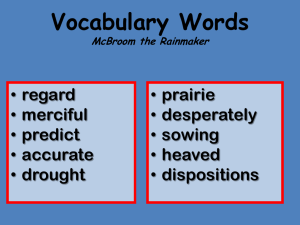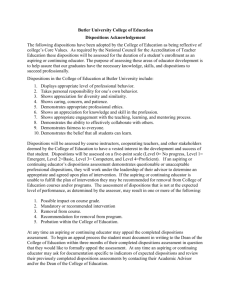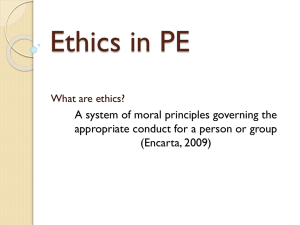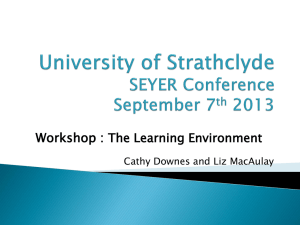Hume*s metaphysics
advertisement
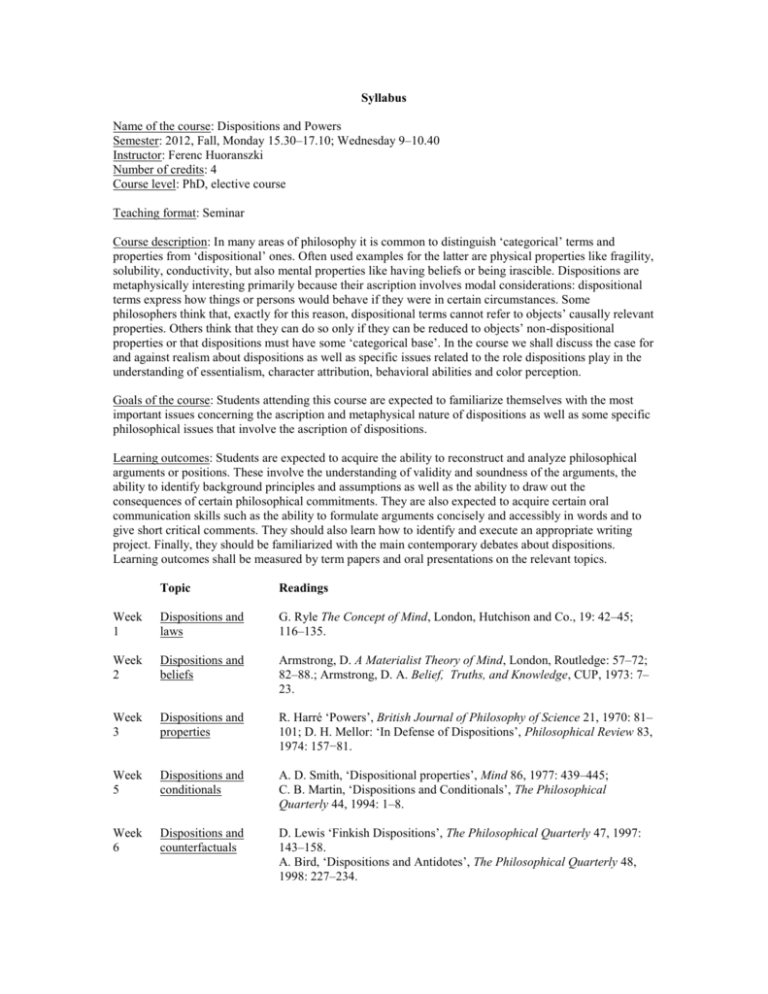
Syllabus Name of the course: Dispositions and Powers Semester: 2012, Fall, Monday 15.30–17.10; Wednesday 9–10.40 Instructor: Ferenc Huoranszki Number of credits: 4 Course level: PhD, elective course Teaching format: Seminar Course description: In many areas of philosophy it is common to distinguish ‘categorical’ terms and properties from ‘dispositional’ ones. Often used examples for the latter are physical properties like fragility, solubility, conductivity, but also mental properties like having beliefs or being irascible. Dispositions are metaphysically interesting primarily because their ascription involves modal considerations: dispositional terms express how things or persons would behave if they were in certain circumstances. Some philosophers think that, exactly for this reason, dispositional terms cannot refer to objects’ causally relevant properties. Others think that they can do so only if they can be reduced to objects’ non-dispositional properties or that dispositions must have some ‘categorical base’. In the course we shall discuss the case for and against realism about dispositions as well as specific issues related to the role dispositions play in the understanding of essentialism, character attribution, behavioral abilities and color perception. Goals of the course: Students attending this course are expected to familiarize themselves with the most important issues concerning the ascription and metaphysical nature of dispositions as well as some specific philosophical issues that involve the ascription of dispositions. Learning outcomes: Students are expected to acquire the ability to reconstruct and analyze philosophical arguments or positions. These involve the understanding of validity and soundness of the arguments, the ability to identify background principles and assumptions as well as the ability to draw out the consequences of certain philosophical commitments. They are also expected to acquire certain oral communication skills such as the ability to formulate arguments concisely and accessibly in words and to give short critical comments. They should also learn how to identify and execute an appropriate writing project. Finally, they should be familiarized with the main contemporary debates about dispositions. Learning outcomes shall be measured by term papers and oral presentations on the relevant topics. Topic Readings Week 1 Dispositions and laws G. Ryle The Concept of Mind, London, Hutchison and Co., 19: 42–45; 116–135. Week 2 Dispositions and beliefs Armstrong, D. A Materialist Theory of Mind, London, Routledge: 57–72; 82–88.; Armstrong, D. A. Belief, Truths, and Knowledge, CUP, 1973: 7– 23. Week 3 Dispositions and properties R. Harré ‘Powers’, British Journal of Philosophy of Science 21, 1970: 81– 101; D. H. Mellor: ‘In Defense of Dispositions’, Philosophical Review 83, 1974: 157−81. Week 5 Dispositions and conditionals A. D. Smith, ‘Dispositional properties’, Mind 86, 1977: 439–445; C. B. Martin, ‘Dispositions and Conditionals’, The Philosophical Quarterly 44, 1994: 1–8. Week 6 Dispositions and counterfactuals D. Lewis ‘Finkish Dispositions’, The Philosophical Quarterly 47, 1997: 143–158. A. Bird, ‘Dispositions and Antidotes’, The Philosophical Quarterly 48, 1998: 227–234. Week 7 Dispositions and causal powers S. Shoemaker ‘Causality and Properties’, in Kim, J. – E. Sosa, (eds.) Metaphysics. An Anthology, Oxford: Blackwell, 1999: 253-268; Hawthorne, J. ‘Causal Structuralism’ Philosophical Perspectives, 15, 2001: 361–378. Week 8 Dispositions and essences Ellis, B. & Lierse, C., ‘Dispositional Essentialism’, Australasian Journal of Philosophy 72: 1994: 27–45. Mumford, S. ‘Kinds, Essences, Powers’ Ratio 18, 2005: 420–436. Week 9 Dispositions and causes Mackie, J. L. ‘Dispositions, Grounds and Causes’, Synthese 34, 1977: 361–369; McKitrick, J., ‘Dispositions, Causes, and Reduction’, in T. Handfield (ed.), Dispositions and Causes, OUP, 2009: 31–64. Week 10 Dispositions and character traits R. Brandt ‘Traits of Character: A Conceptual Analysis’ in his Morality, Utilitarianism, and Rights, CUP, 1992): 263–288; Butler, D. ‘Character Traits in Explanation’ Philosophy and Phenomenological Research 1988: 215–238. Week 11 Dispositions, abilities, and freedom Clarke, Randolph, ‘Dispositions, Abilities to Act, and Free Will: The New Dispositionalism’ Mind, 118, 2009: 323–351 Week 12 Dispositions and secondary qualities Paul A. Boghossian and J. David Velleman ‘Colour as a Secondary Quality’ Mind, 98, 1989: 81–103. Some suggested further readings: Goodman, N. Fact, Fiction, and Forecast, Harvard UP, 1983 Prior, E. Dispositions. Aberdeen University Press, 1985. Crane, T. (ed.) Dispositions: A Debate. Routledge, 1996. Mumford, D. Dispositions. OUP, 1998. Ellis, B. Scientific Essentialism. CUP, 2001. Molnar, G. Powers: A Study in Metaphysics. OUP, 2003. Bird, A. Nature’s Metaphysics. OUP, 2007. Assessment: Students’ performance shall be evaluated on the following grounds. First, students are required to attend classes regularly and to participate actively in seminar discussions. They should be able to make comments on the texts they have read and respond to the presentations of other student. 30 % of their final grade shall be given on the basis of this in-class activity. Second, students are required to give one or two short presentations of some chosen topic(s) which must include the logical reconstruction of the main arguments of the text and, possibly, interpretative remarks or questions for discussion. They are also expected to prepare and distribute a maximum two page long hand-out that they distribute before their presentation. The choice of topic is optional, but overlap should be avoided. This will make up another 30 % of their final grade. Thirdly, students are required to submit a max. 4 000 word long term-paper. The topic of the paper can be either a careful critical reconstruction of a particular and important argument for some position discussed in the course; or a comparison between competing arguments about alternative solutions to a problem; or a defense of some particular position/argument against some relevant criticism. The chosen topic should be approved by the instructor and presented in the last class of the course. References can, but need not, go beyond the material included into the compulsory readings. The term paper’s contribution to the final assessment of students’ performance is 40 %. Deadline for submitting term-papers: 7. January, 2013.

